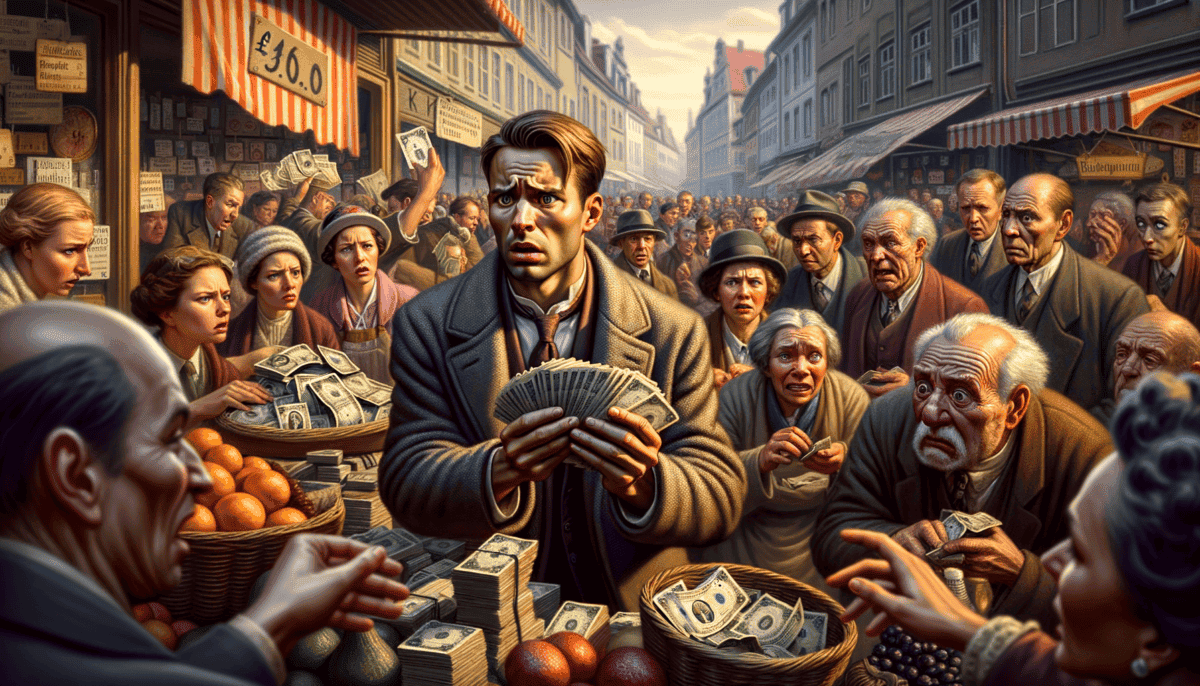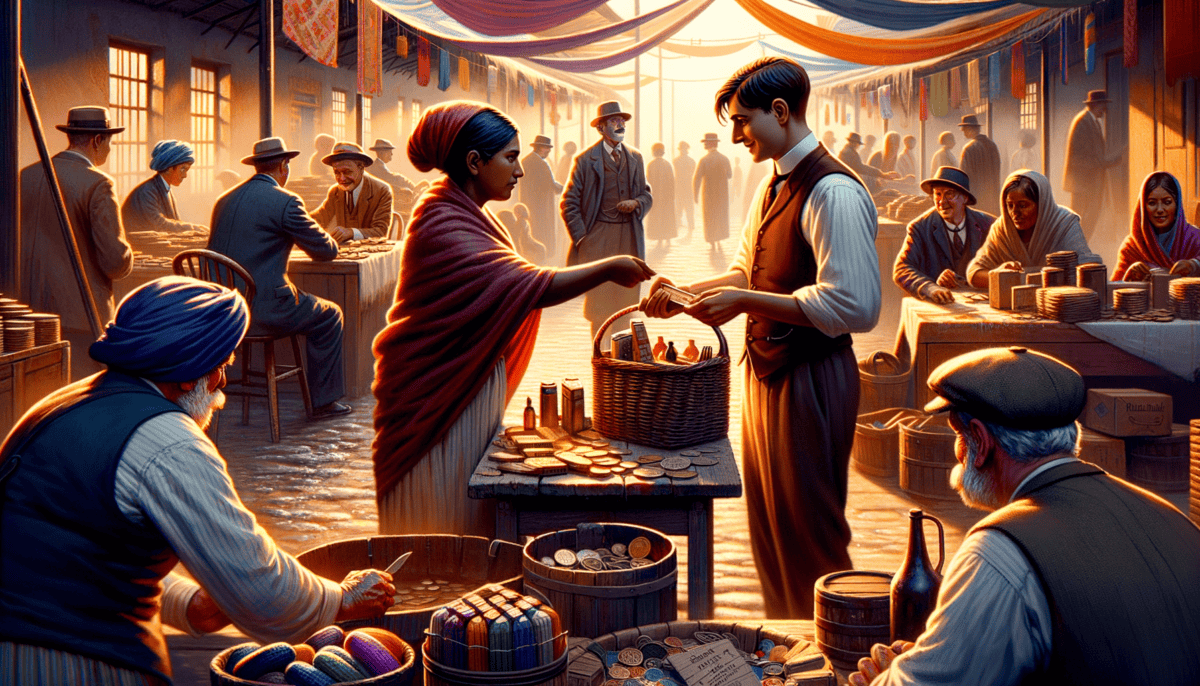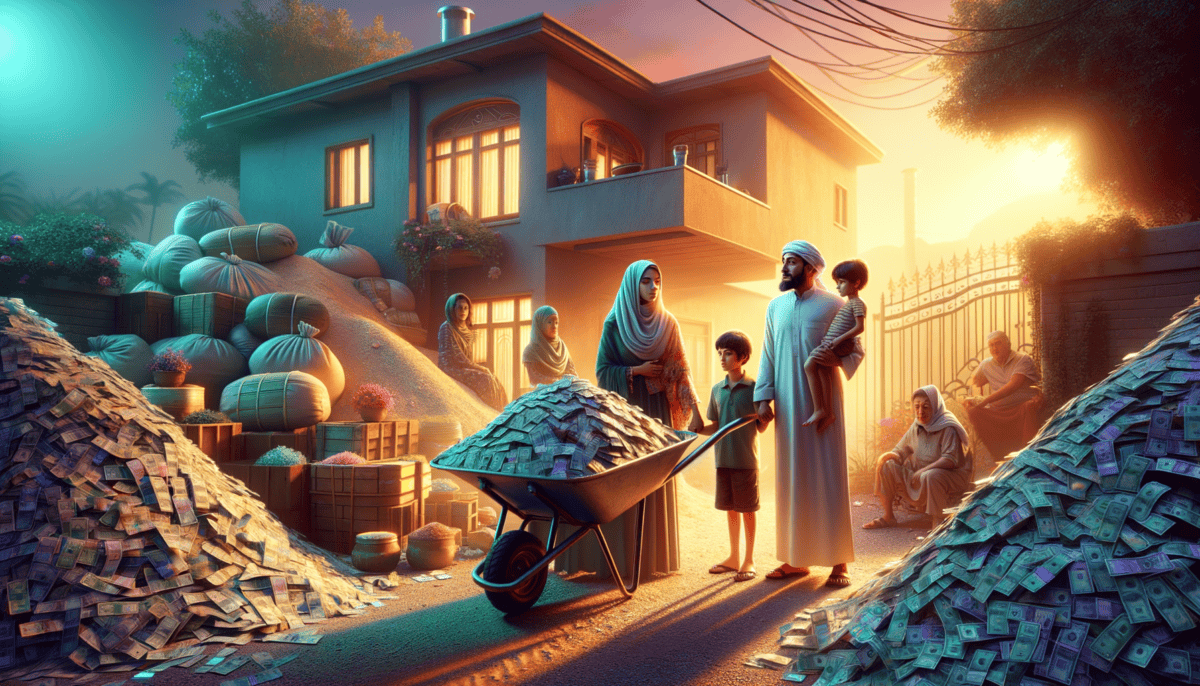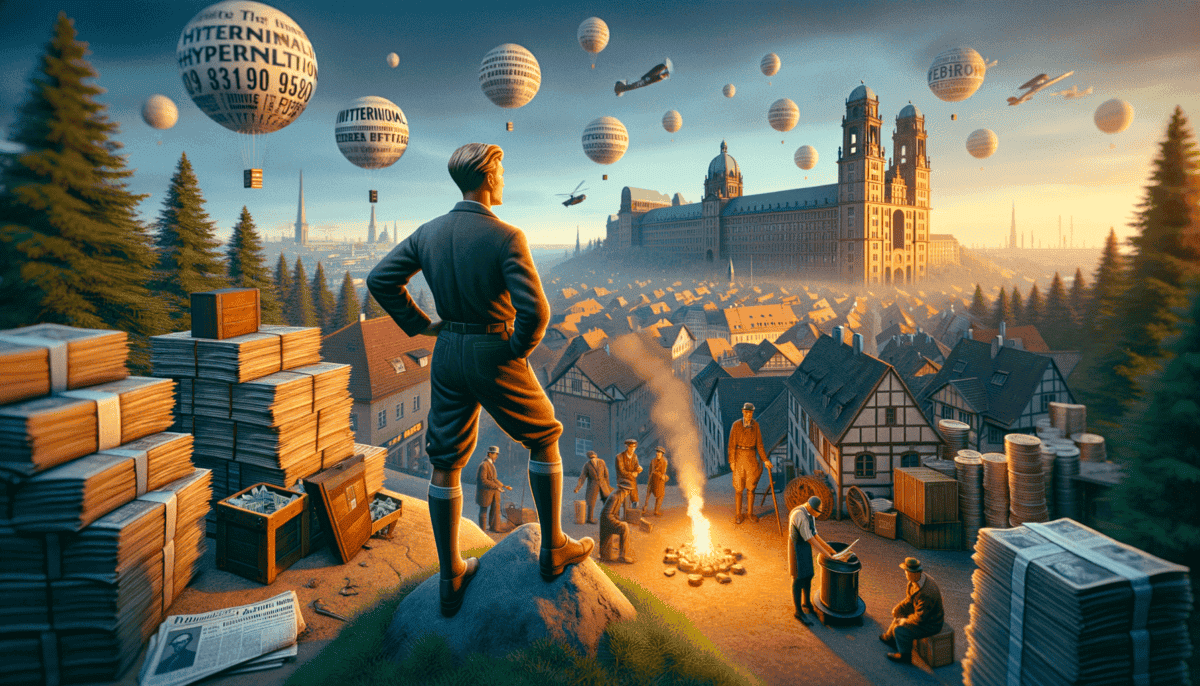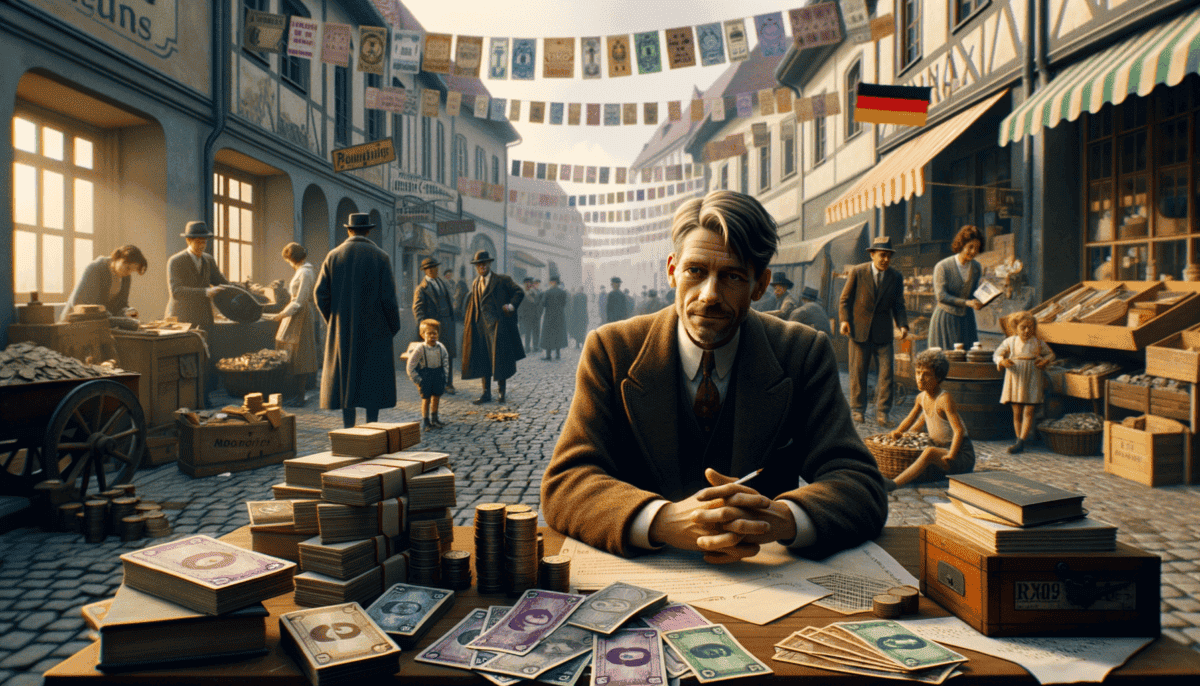The Calm Before the Storm
The morning sun peeked through the curtains as Hans Mueller straightened his tie. At twenty-three, he was proud of his job at the Berlin Central Bank. The shiny brass nameplate on his desk made him feel important.
"Another beautiful day to help people with their money," Hans said to himself, adjusting his collar in the mirror.
His mother's voice called from downstairs: "Hans! Don't forget your breakfast!"
The kitchen was warm and cozy. The smell of fresh bread filled the air. Hans's mother, Emma, placed a steaming cup of coffee in front of him. His father, Otto, sat reading the morning newspaper.
"Look at these war payments," Otto grumbled, pointing to the headline. "The government keeps printing more money to pay our debts."
Hans sipped his coffee. "Don't worry, Father. The Mark is strong. Everyone at the bank says so."
Emma placed a warm roll on Hans's plate. "Things cost a bit more at the market lately," she said softly. "But we manage."
At the bank, Hans helped customers with their savings. Most people trusted their money would be safe there. Old Mrs. Weber came in every Tuesday to deposit her pension.
"Such a good boy," she always said, patting Hans's hand. "Taking care of our money."
But today was different. Mr. Schmidt, a regular customer, seemed worried as he approached Hans's desk.
"I'd like to withdraw all my savings," he whispered.
Hans blinked in surprise. "But sir, your money is perfectly safe here."
Mr. Schmidt leaned closer. "My brother in Switzerland says our Mark is getting weaker. Better to be careful."
• Prices slowly going up
• People worried about their savings
• Government printing more money
• Other countries losing trust in German money
That evening, Hans walked home slowly. The streets of Berlin looked the same as always. Children played with marbles on the sidewalk. Shop owners swept their doorsteps. Everything seemed normal.
But something felt different. Like the quiet before a storm.
At dinner, Otto showed Hans a loaf of bread. "This cost more today than last week," he said. "And last week it cost more than the week before."
Hans pushed his food around his plate. "Maybe it's just temporary?"
Emma touched his hand. "I hope you're right, dear. But perhaps we should be careful with our spending."
That night, Hans couldn't sleep. He thought about Mr. Schmidt's worried face. About his father's newspaper. About the growing stack of freshly printed money at the bank.
“Sometimes,” his grandmother used to say, “the biggest changes start so quietly that most people don’t notice until it’s too late.”
Hans walked to his window and looked out at the peaceful city. The streets were quiet. The moon was bright. Everything looked perfect.
But in his heart, Hans knew something was changing. He just didn't know how big those changes would be.
Through his open window, he heard the distant sound of printing presses running late into the night. The government was making more money, trying to pay its debts.
Little did Hans know, those printing presses would soon become the heartbeat of a nation's nightmare. The calm he felt tonight was just the beginning of a storm that would change everything.
Money Becomes Paper
Hans noticed something strange at the bank one morning. The stack of money on his desk was different. The numbers were bigger. Much bigger.
“Why are these bills so large?” he asked his supervisor.
“We need bigger numbers to keep up with prices,” she explained. “Yesterday’s 100 Mark bill isn’t enough to buy today’s bread.”
At lunchtime, Hans watched people rushing to spend their money as fast as they could. The bakery changed its prices three times that morning.
“How much for a loaf?” asked a customer.
“5,000 Marks,” said the baker. “But wait too long, and it might be 10,000.”
On his way home, Hans saw children playing with stacks of money. They were building houses with the bills – paper money had become cheaper than toy blocks!
“Money is just paper now,” a little girl said, making a paper airplane with a 1,000 Mark bill. “Mama says it’s worth more as a toy.”
At home, Emma was crying in the kitchen. “I went to buy eggs this morning,” she sobbed. “By afternoon, the price had doubled!”
Otto put his arm around her. “We must spend our paychecks the minute we get them,” he said. “Before the money loses more value.”
• Prices change many times each day
• People rush to spend their money fast
• Bills have very big numbers
• Money becomes worthless quickly
Hans remembered Mrs. Weber and her savings. He found her sitting on a park bench, feeding pigeons.
“Mrs. Weber,” he said gently, “you should spend your pension right away now.”
She looked up sadly. “My whole life’s savings,” she whispered. “Now it won’t even buy a loaf of bread.”
The next day at the bank was chaos. People lined up for hours to get their money out. By closing time, the line stretched around the block.
“Your money will be worth less tomorrow,” people warned each other. “Spend it today!”
That evening, Hans watched his father counting the day’s pay. Otto’s hands trembled as he sorted through the massive stack of bills.
“We must buy food now,” Otto said. “By morning, these bills might be worthless.”
Hans looked at the money in his hands. The numbers were huge – millions of Marks! But they couldn’t buy what a few Marks bought last month.
Through his window, Hans could still hear the printing presses. They ran day and night now, making more and more money. But each new bill was worth less than the last.
As he fell asleep, Hans remembered when money meant something. When people saved it proudly in banks. When his brass nameplate meant he was protecting people’s wealth.
Now money was just paper. And tomorrow, it would be worth even less.
Living Without Money
Hans woke up to find his mother Emma trading her silver necklace for eggs.
“Money doesn’t work anymore,” Emma explained. “We must trade things instead.”
At the bank, Hans watched people bringing in wheelbarrows of money. But the bank couldn’t help anymore. Paper money was becoming useless.
“What can we do?” asked a worried customer.
“Trade things you have,” Hans suggested. “That’s what my family does now.”
After work, Hans visited the market. It looked very different. Instead of price tags, signs read:
“Will trade bread for shoes”
“Eggs for firewood”
“Milk for blankets”
Hans saw his neighbor, Mr. Schmidt, trading his watch for food. ️
“My grandfather gave me this watch,” Mr. Schmidt said sadly. “But my children need to eat.”
At home, Otto was teaching Hans a new way to live. “Look for things that keep their value,” he explained. “Like tools, gold, or useful skills.”
• Trading things instead of using money
• Keeping valuable items like gold
• Learning useful skills
• Helping each other
Hans learned to fix things. He mended Mrs. Weber’s broken chair, and she taught him to grow vegetables.
“Skills are worth more than money now,” Mrs. Weber smiled. “No one can take them away.”
The community grew closer. Neighbors shared what they had. Old Mr. Fischer fixed bikes in exchange for food. Young Lisa helped with gardens for meals.
“We are stronger together,” Emma said, sharing soup with neighbors. “Money divided us. Now we help each other.”
Hans started a trading circle at the bank. People could meet and swap things they needed. Soon, the empty bank lobby became busy again.
“You’ve given us hope,” his supervisor said. “This is better than watching money die.”
One evening, Hans found his old brass nameplate from the bank. He traded it to the baker for a loaf of bread.
“The brass is worth something,” the baker said. “The title ‘Bank Clerk’ isn’t anymore.”
That night, Hans wrote in his diary: “Money failed us. But we didn’t fail each other.”
Emma called the family to dinner – soup made from vegetables they’d grown, bread earned through work, and hope built by helping others.
“We lost our money,” Otto said, “but we found something better. We found our strength.”
As Hans helped clean up, he saw children playing outside. Instead of building houses with worthless money, they were working together in a vegetable garden.
The street was alive with people trading, helping, and sharing. Money had lost its magic, but people had found their power.
Through his window, Hans could no longer hear the printing presses. But he heard something better – neighbors talking, children laughing, and community growing stronger.
When Money Meant Nothing
The streets of Berlin were chaos. People ran with huge bags of money.
“One loaf of bread now costs 4 billion marks!” Hans told his family at breakfast. “Yesterday it was 2 billion.”
Emma looked at their savings box with tears in her eyes. “All our hard work… gone.”
At the bank, things were worse. People crowded the lobby, shouting and crying. Hans watched as an old woman emptied a wheelbarrow of cash onto his desk.
“This was my life savings,” she whispered. “Now it won’t buy a loaf of bread.”
Outside, children made kites from money bills. A boy built a tower with stacks of worthless cash.
“Money is just paper now,” the boy laughed. “It’s not even good for games anymore.”
Hans saw Mr. Schmidt sitting on his doorstep, holding his head in his hands. His shop had closed. Nobody could afford to buy anything anymore.
“What will we do?” Mrs. Schmidt asked, holding their baby. “How will we feed our children?”
At home, Otto gathered the family. “We must face the truth,” he said. “Our money is dead.”
• Prices doubled every few hours
• People needed wheelbarrows for shopping
• Savings became worthless
• Shops closed down
• Banks couldn’t help anymore
That night, Hans couldn’t sleep. He heard his mother crying in the kitchen. Their neighbor’s lights were on too – nobody could rest.
“The whole country is awake,” Emma said, making tea. “We’re all scared.”
Morning brought more bad news. The bank would close. Hans’s job was gone.
“I’m sorry,” his supervisor said. “Money doesn’t mean anything anymore. We can’t help people.”
Walking home, Hans saw people burning money for heat. Children played with stacks of bills like toys.
A crowd gathered around a man shouting: “The government has failed us! Our money is trash!”
Emma hugged Hans when he got home. “We still have each other,” she said. “That’s worth more than all the marks in Germany.”
Otto nodded. “We survived a war. We’ll survive this too.”
That evening, the family sat in darkness. They couldn’t afford candles. But through the window, Hans saw stars.
“Even when everything falls apart,” Otto said, “some things keep shining.”
Hans held his last paycheck – billions of marks, worth nothing. He folded it into a paper boat.
“Maybe it can finally do something useful,” he said, floating it in a puddle for a child to play with.
The streets grew quiet as night fell. But Hans knew tomorrow would bring new challenges. The money was gone, but their story wasn’t over.
A World Watches and Worries
News of Germany’s money trouble spread around the world. Hans read papers from other countries at his neighbor’s house.
“Look at this,” Mr. Weber said, showing Hans an English newspaper. “They’re talking about us in London!”
“Germany’s Money Crisis Shakes Europe – Could It Happen Here?”
People from other countries came to see. They took pictures of children playing with piles of money. Some bought German marks cheap, thinking they might be worth something later.
Hans saw new faces in town. People from France, England, and America walked the streets, looking shocked.
“Is it true you need a wheelbarrow of money to buy bread?” a French reporter asked Hans.
“Sometimes two wheelbarrows now,” Hans answered.
Emma found work helping foreign visitors. They paid her in different money that was still worth something.
“At least dollars and pounds still buy food,” she said, bringing home some bread.
Otto heard stories about other places where money had failed:
• Hungary after the war
• Russia during hard times
• Austria when things got bad
• Poland when prices went crazy
• Greece during tough years
“We’re not alone,” Otto told the family. “Other people have lived through this too.”
New ideas started growing. Some towns made their own money. Others used foreign money. People tried to fix things themselves.
“Look!” Hans showed Emma a newspaper. “Some cities are printing their own special money that doesn’t lose value!”
Big changes came to German politics too. Old leaders lost their jobs. New ones promised to fix things.
“Things will get better,” a new leader said on the radio. “We will make our money strong again.”
Hans saw hope in people’s eyes for the first time in months.
“Maybe we can learn from this,” Emma said. “Maybe we can build something better.”
Mr. Weber started a trading group. People brought what they could share – food, clothes, tools. They helped each other without using money.
“See?” he told Hans. “We don’t need marks to be rich. We have each other.”
One day, Hans got exciting news. A bank from Switzerland wanted to open a new office in town. They needed people who knew banking.
“They want to interview me!” Hans told his family. “They say I understand money problems better than anyone!”
Emma hugged him tight. “You learned from the hard times. Now you can help stop it from happening again.”
That night, Hans looked at his old bank uniform. He remembered when money meant something different.
“We’ll make it mean something good again,” he promised himself. “Something that helps people instead of hurting them.”
The stars seemed brighter that night. Tomorrow would bring new chances to make things right.
Hope Rises from the Ashes
The sun rose bright over Germany as Hans walked to his new job. The Swiss bank’s sign gleamed above the door. Things felt different now.
“Welcome to your first day, Mr. Mueller,” said Mr. Schmidt, his new boss. “We need people who understand what went wrong.”
Hans smiled, remembering his old bank from just a year ago. Now he had a chance to help fix things.
Emma ran a small shop now. She traded fairly and helped people save their new money.
“Remember when we couldn’t buy bread?” she asked Hans one evening. “Now look – our shelves are full!”
Otto helped teach others about saving money. He went to schools and told children:
• Save a little every week
• Don’t spend more than you have
• Keep some money for hard times
• Help others when you can
• Trust good banks
Mr. Weber’s trading group turned into a real store. People still helped each other, but now they used good money too.
“We learned something important,” Hans told a group of new bank workers. “Money only works when people trust it.”
The town grew stronger. Gardens bloomed where empty lots had been. Children played with toys instead of worthless paper money.
Hans kept one old million-mark bill in his desk. It reminded him of the hard times they lived through.
“Why do you keep that?” asked a young worker.
“To remember,” Hans said. “So we never let it happen again.”
Five years later, Hans sat in his garden with Emma. Their children played nearby with shiny new toys.
“We made it,” Emma smiled. “We’re stronger now.”
Hans nodded. “And we help others be strong too.”
The whole country learned big lessons:
• Take care of money carefully
• Help each other in hard times
• Save for tomorrow
• Trust makes money work
• Hope makes everything possible
That night, Hans wrote in his diary: “Money isn’t just paper. It’s trust. It’s hope. It’s people working together. We lost everything once, but we found something better – we found each other.” ✨
All over Germany, people told stories about the hard times. But they also told stories about getting better. About helping each other. About building something new.
Years later, when Hans’s grandchildren asked about the old million-mark bill in his desk, he smiled and said, “Let me tell you a story about when money lost its magic – and how we found something more magical instead.”
The wheelbarrows that once carried worthless money now carried flowers and vegetables from community gardens.
Banks became places that helped people, not just buildings full of paper. Schools taught children about saving and sharing.
Hans kept teaching others what he learned. “Money comes and goes,” he would say, “but good people working together – that’s what makes a country rich.”
Every year, on the day the new money came, Hans’s family had a special dinner. They shared food with neighbors and remembered how far they’d come.
Germany grew strong again. Other countries learned from what happened. People everywhere understood better how to take care of their money.
And in Hans’s old bank building, now a museum, that last wheelbarrow of worthless marks sat behind glass. Under it, a sign read: “Remember the past. Build a better future.”
Hans smiled every time he walked past it. They had built something better – not just with money, but with hope, trust, and people helping people.


